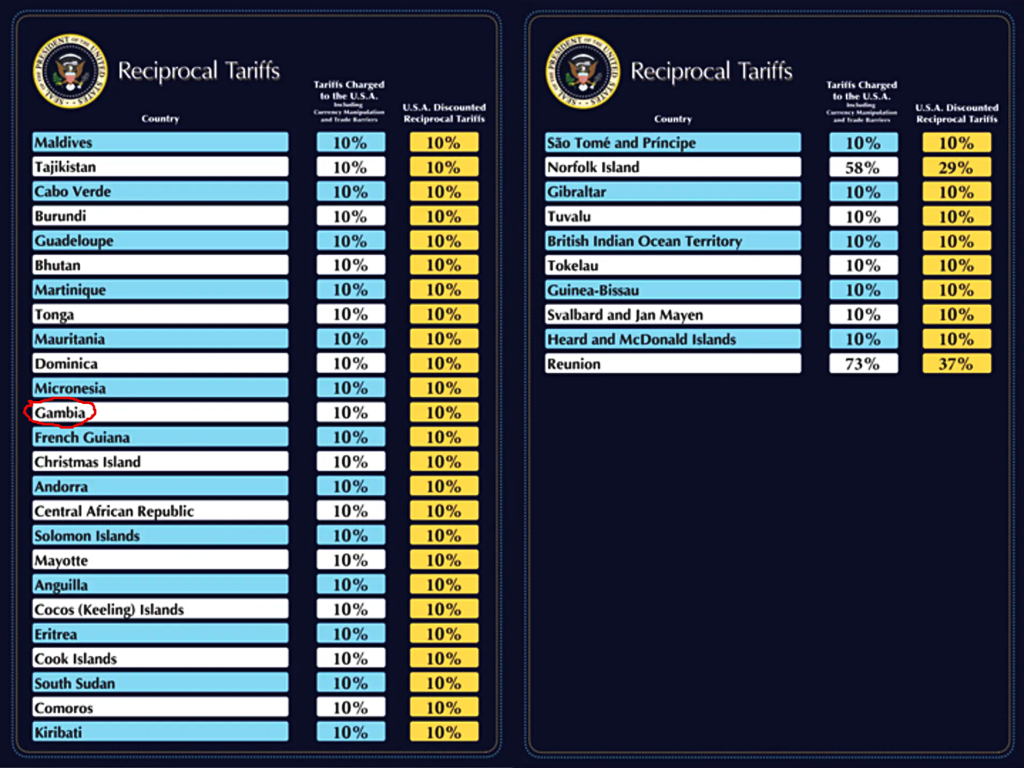Gambiaj.com – (WASHINGTON, DC) – President Donald Trump on Wednesday announced a 10% baseline tariff on some countries (including The Gambia) and sweeping new tariffs on nearly all U.S. trading partners, imposing a 34% tax on imports from China and a 20% levy on the European Union, among other measures. The move, aimed at revamping global trade dynamics, threatens to unravel decades of economic cooperation and trigger retaliatory actions from affected nations.
Speaking from the White House Rose Garden, Trump justified the tariffs as a necessary step to restore fairness in international trade and bolster American manufacturing. He declared a national economic emergency, allowing him to bypass Congress under the 1977 International Emergency Powers Act.
“Our country has been looted, pillaged, raped, and plundered,” Trump said, employing some of his strongest rhetoric to date against foreign trade partners. He argued that the tariffs would generate hundreds of billions in revenue for the U.S. government while reversing long-standing trade imbalances.

Under the new policy, a 10% baseline tariff will apply to all imports, with higher rates targeting nations with significant trade surpluses against the U.S. The administration claims that the policy is designed to rebalance a $1.2 trillion trade deficit.
Economic and Political Fallout
The tariffs, described by analysts as the most aggressive U.S. trade measures since the 1930s, could lead to widespread economic disruptions. American consumers are expected to face rising costs on essential goods such as automobiles, clothing, and housing materials. The stock market responded sharply, with U.S. futures plunging overnight amid fears of an economic slowdown.
Olu Sonola, head of U.S. economic research at Fitch Ratings, warned that the U.S. tariff rate would jump from 2.5% to an average of 22%, potentially pushing multiple economies into recession.
“You can throw most forecasts out the door if this tariff rate stays on for an extended period of time,” Sonola said.
Trump’s policy also faces resistance from within his own party. Several Republican senators, particularly those from agricultural and border states, have questioned the tariffs’ impact on farmers and small businesses. Some fear that the president’s decision could undermine his efforts to curb inflation, a key issue in his re-election campaign.
Rep. Suzan DelBene (D-Wash.) called the tariffs a “massive tax increase on American families” and criticized Trump for implementing them without congressional approval.
Even Republican leaders, while expressing confidence in Trump’s strategy, acknowledged the potential economic turbulence. House Speaker Mike Johnson (R-La.) remarked, “It may be rocky in the beginning, but I think this will make sense for Americans in the long run.”
Global Reactions and Retaliation Threats
International reactions to Trump’s announcement ranged from cautious to confrontational. China, a primary target of the new tariffs, issued a restrained statement:
“China believes that protectionism leads nowhere, and trade and tariff wars have no winners.”
European leaders were more direct in their criticism. Italian Prime Minister Giorgia Meloni called Trump’s tariffs “wrong” and vowed to negotiate a resolution with Washington to avoid economic fallout. Canadian Prime Minister Mark Carney warned that the tariffs would “fundamentally change the international trading system” and pledged retaliatory measures.
The European Union has already imposed countermeasures on U.S. goods worth €26 billion ($28 billion) in response to previous steel and aluminum tariffs. In return, Trump threatened a 200% tax on European alcohol imports.
“In a crisis, it’s essential to act with purpose and force, and that’s what we will do,” Carney stated.
For businesses dependent on international trade, Trump’s tariffs spell higher production costs and potential price hikes. Jay Foreman, CEO of Basic Fun, a toy manufacturer, said the new tariffs on Chinese imports will force price increases on popular products like Tonka trucks, which could jump from $29.99 to as much as $45. “There is no other way,” Foreman said.
What’s Next?
The administration’s tariff strategy is set to roll out in phases. The 10% baseline tariff will take effect Saturday, while the higher rates will be enforced beginning April 9. Trump has also removed exemptions on Chinese imports valued at $800 or less, with plans to extend that policy to other nations.
Despite growing economic concerns, the White House remains firm in its stance, insisting that the tariffs are a necessary correction to decades of trade imbalances. Whether Trump’s bold move will reinvigorate American manufacturing or ignite a full-scale global trade war remains to be seen.










